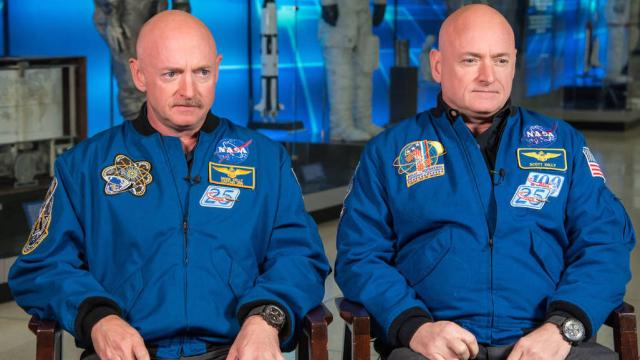After recent events, we’re all ready to hop aboard the next flight to Mars. But before us Earthlings embark on a seven-month journey to the Red Planet, we need to understand how the harsh conditions of space can affect our bodies.
Image: NASA
Thankfully, astronauts Scott and Mark Kelly have willingly volunteered themselves as test subjects for NASA, which has been studying the pair since they have returned from their respective voyages in space: The identical twin brothers are the subject of a 10-part investigation to understand the impact of space travel on the body. Researchers collected blood samples and other biological materials while the twins were both on Earth and in orbit, and are now comparing them for the aptly-named Twins Study.
While the full results of the Twins Study probably won’t be released for another year or two, the first findings are now in. Samples taken before, during and after Scott Kelly’s most recent mission — in which he spent 340 days in space — “reveal[ed] changes in gene expression, DNA methylation and other biological markers,” Nature reports. According to the team of scientists leading the study, these changes are “likely to be attributable” to Scott’s lengthy stay in space. The team presented their preliminary findings on January 26 at a meeting of scientists working in NASA’s Human Research Program in Galveston, Texas.
“The greatest importance of the study is to show that we can do it,” team member Andrew Feinberg, a geneticist at Johns Hopkins University School of Medicine in Baltimore, said. “I don’t think people realised it would be so easy to do genomics on astronauts in space.”
While “easy” is a debatable way of describing these tests, they’re definitely thorough — and revealing.
As identical twins, the brothers are genetically very similar. However, researchers found that while he was in orbit, Scott’s telomeres — the caps on the ends of chromosomes — grew longer than his twin brother’s. Though Scott’s telomeres returned to their pre-flight lengths shortly after he returned to Earth, these results were totally unexpected, since telomeres naturally shrink over the course of one’s life, and the stresses of spaceflight are supposed to accelerate this. At least that was the idea.
“That is exactly the opposite of what we thought,” Susan Bailey, a radiation biologist at Colorado State University, told Nature.
John Charles, chief scientist at NASA’s Human Research Program, said scientists are interested in telomere length during space travel because their erosion could cause health defects during long-term missions. It is critical to understand these potential health risks before sending astronauts on long voyages, such as one to Mars.
Even though Scott’s telomeres miraculously lengthened, this is still worth reviewing.
“It’s important to appreciate that telomere lengthening is not always a good thing, as telomere lengthening is also associated with some disease processes and pathologies,” Charles told Gizmodo. “That is not the case in this instance, however.”
Another mystery in these results involves DNA methylation — a process in which methyl groups are added to DNA molecules to control gene expression. Researchers found that this process decreased while Scott was in orbit, but increased in Mark over the same period of time.
“Methylation is how the gene turns off the sections that do not need to be copied,” Charles told Gizmodo. “Measuring changes in methylation is a way to document how active the gene is in different circumstances and to determine which sections of the gene are not being read and transcribed because the body does not need the proteins encoded in those sections. These measurements help us understand how the body responds to spaceflight factors at the level of the gene.”
Scientists observed more dramatic shifts in gene expression in Scott, who has spent more time in space — 520 days total — than his brother. These shifts could be attributed to the harsh conditions (such as eating freeze-dried food, changes in sleep patterns and exposure to microgravity). Now, the researchers will turn their attention to nailing down what exactly is causing molecular changes to occur.
“If the Kellys had not been selected as astronauts, then NASA might still be on a slower path to embracing genomic research,” Charles said.
Figuring out how the human body responds to long-term spaceflight is a lot of work, but someone’s gotta do it. Especially if we want that cat colony on Mars I’ve been dreaming about.
[Nature]
